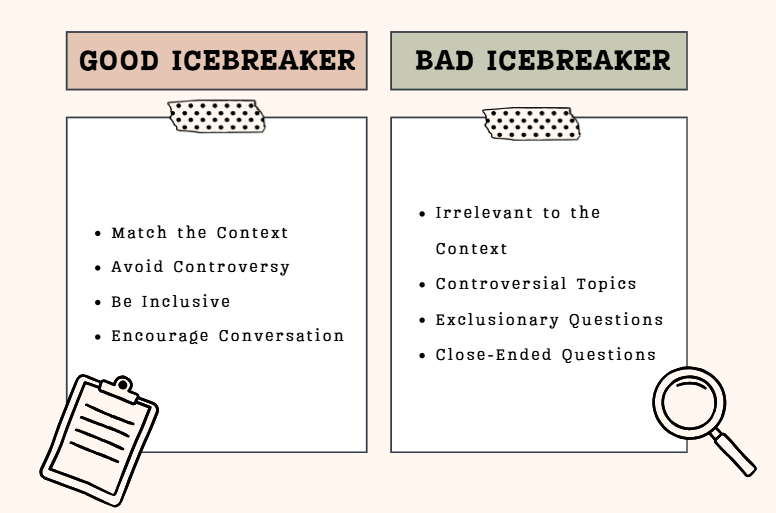Rules & Tips for Ice Breaker Questions
Brief Tips for Ice Breaker
- Keep the atmosphere light and friendly
- Respect everyone's boundaries and comfort levels
- Give everyone a chance to participate
- Listen actively when others are sharing
- Avoid controversial or sensitive topics
General Rules

While icebreaker questions are a great tool, it's important to approach them strategically. Here are some essential rules to follow when using icebreaker questions:
- Keep It Relevant to the Context
Not all icebreaker questions will work in every situation. It's essential to match the questions to the context. For example, asking about someone's favorite book may be a great icebreaker for a book club meeting, but it may not be the best question at a corporate conference. If you're at a professional event, try icebreaker questions that are work-related or industry-specific, like, “What’s one project you’ve worked on recently that you’re proud of?” For a casual get-together, a fun icebreaker question could be, “If you could travel anywhere right now, where would you go?” - Avoid Controversial Topics
While it’s tempting to ask deep or provocative icebreaker questions, it’s important to avoid controversial topics, especially in the early stages of a conversation. Questions about politics, religion, or personal beliefs can lead to uncomfortable situations if the participants are not familiar with each other. Stick to icebreaker questions that are neutral and non-divisive. For instance, “What’s your favorite type of music?” or “What’s a hobby you’ve always wanted to try but never did?” are safe yet interesting icebreaker questions that encourage people to share without causing discomfort. - Make Sure Everyone Feels Included
An effective icebreaker question should be inclusive and accessible to everyone. Avoid questions that might make some individuals feel left out or uncomfortable. For example, if you ask about someone’s favorite childhood memory, someone who had a challenging childhood may not be able to participate easily. Consider more inclusive icebreaker questions, such as, “What’s one thing that always makes you smile?” or “If you could have any superpower, what would it be?” - Encourage Open-Ended Responses
To get the conversation flowing, ask icebreaker questions that encourage open-ended responses. Avoid questions that can be answered with a simple “yes” or “no,” as these may quickly shut down the conversation. For example, instead of asking, “Do you like sports?” you could ask, “What’s your favorite sport and why?” This will prompt the person to elaborate on their answer, which in turn makes the conversation more engaging and interactive. - Keep It Light and Fun
The purpose of icebreaker questions is to ease the tension and make people feel at ease. So, don’t overcomplicate the questions. Keep them light, fun, and engaging. You can even include some humor in your icebreaker questions. For example, “If you were a superhero, what would your superpower be?” or “If you could switch lives with any animal for a day, which animal would you be and why?” Such playful questions help people relax and get to know each other better in a non-threatening way.
Common Mistakes with Icebreakers
- Irrelevant icebreaker questions
Wrong Example:
"What's your favorite book?"
Not contextually appropriate: In a professional or corporate setting, asking about someone's favorite book might not be relevant to the discussion and could divert attention from the main topic.
May make some uncomfortable: Not everyone may feel comfortable sharing their favorite book, especially if it's a formal event where personal preferences are not expected to be discussed.
Improvement: For a professional setting, ask something like, “What’s a recent project you've worked on that you're proud of?” This stays relevant to the environment. - Asking About Controversial Topics
Wrong Example:
"Which political party do you support?"
Can lead to conflict: Political questions can easily divide people, especially when they don't know each other well. These topics may spark heated debates, causing discomfort.
Excludes people: Not everyone feels comfortable discussing their political views, especially in a group setting.
Improvement: Avoid controversial topics and ask more neutral questions like, "What kind of music do you enjoy?" which encourages participation without causing discomfort. - Questions That Exclude Some People
Wrong Example:
"What was your favorite childhood memory?"
Can alienate people: Not everyone has positive or memorable childhood experiences, and asking about them might make some feel excluded or uncomfortable.
Lack of inclusivity: People who had a difficult childhood may not have a “favorite” memory to share, which could make them feel awkward.
Improvement: Try asking more inclusive questions such as, “What’s something that always makes you smile?” This allows everyone to share something positive without putting them in a potentially awkward position. - Yes/No Questions
Wrong Example:
"Do you like sports?"
Closes down conversation: A simple yes/no question doesn’t invite much discussion and can lead to an awkward pause after the answer.
Limits engagement: Once someone answers “yes” or “no,” the conversation tends to fizzle out without much elaboration.
Improvement: Ask a more open-ended question like, “What’s your favorite sport and why?” This encourages the person to explain their answer and keeps the conversation going.